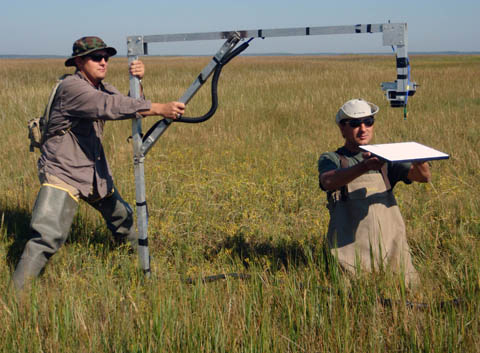Identification of Marsh Stress Hot Spots Leads to Restoration Tool
June 19, 2012

Dr. Deepak Mishra and his research team from Mississippi State University have quantified short-term impacts of the Deepwater Horizon oil spill on Louisiana marshes and developed maps that can inform the restoration prioritization efforts of decision makers. This research is outlined in their published study in the March 2012 edition of
Remote Sensing of Environment.
With support from three Gulf of Mexico Research Initiative (GoMRI) awards, Mishra and his team at MSU were one of the first groups on the ground in 2010 studying the impact of oil on the salt marsh ecosystems of southeastern Louisiana. They were one of the very few academic teams with coastal salt marsh health baseline data when the spill occurred, as his research developing models that linked satellite imageries with ground data to monitor the health of regional salt marshes began in this area in 2009 when he joined MSU. The authors were immediately able to use satellite data and ground experiments to quantify the short-term impact of the oil and dispersants on the coastal salt marshes in the region.
Dr. Mishra and his research team used the satellite data to determine that affected marsh plants first went through visual signs of oiling (oil coating), followed by reduced photosynthetic pigments/activity (yellowing/browning up), and finally cell structural damage (dead biomass). Their model uses four parameters to gauge estuarine health: top of canopy reflectance, leaf area index, canopy level chlorophyll content, and above ground green biomass. Their research used Landsat imagery to produce estimated time-series maps that have the potential to quantify the ecological impacts of the oil spill on salt marsh structure and function. They were able to identify critical hotspots in need of immediate attention and designed a research model that could be applied to other coastal salt marshes in similar circumstances.
To view the full news article, please see:
Gulf of Mexico Research Initiative News.
 Dr. Deepak Mishra and his research team from Mississippi State University have quantified short-term impacts of the Deepwater Horizon oil spill on Louisiana marshes and developed maps that can inform the restoration prioritization efforts of decision makers. This research is outlined in their published study in the March 2012 edition of Remote Sensing of Environment.
Dr. Deepak Mishra and his research team from Mississippi State University have quantified short-term impacts of the Deepwater Horizon oil spill on Louisiana marshes and developed maps that can inform the restoration prioritization efforts of decision makers. This research is outlined in their published study in the March 2012 edition of Remote Sensing of Environment.